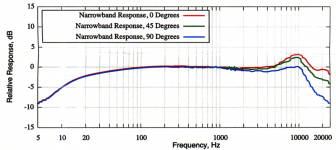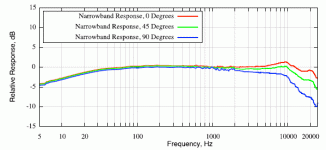hi,
in order to measure the loudspeaker I need a microphone. I've seen around the forums that the Behringer 8000 is popular here. I can purchase it at several places for around $40-$50. I have several questions however.
1. Are there other microphones that are recommended that I should take into account?
2. Do I need to purchase anything else with the microphone for it to work?
3. Do I simply plug this microphone into a line in?
Eitan Waks
in order to measure the loudspeaker I need a microphone. I've seen around the forums that the Behringer 8000 is popular here. I can purchase it at several places for around $40-$50. I have several questions however.
1. Are there other microphones that are recommended that I should take into account?
2. Do I need to purchase anything else with the microphone for it to work?
3. Do I simply plug this microphone into a line in?
Eitan Waks
Hi Eitan,
Almost all mics need a preamp. The ECM8000 is an electret type mic, and does need phantom power. It is recommended that the mic be calibrated, although not strictly necessary - the error caused by not using one is usually a few dB in the treble. Calibration costs about $50. Partsexpress sells a calibrated mic identical to the ECM8000 (for $50), but there has been some question about the quality of the calibration. Parts-Express.com: Dayton EMM-6 Electret Measurement Microphone | BLACK09 Dayton EMM-6 measurement mic measurement microphone mic microphone electret mic electret microphone speaker mic test microphone test mic recording mic recording microphone Audi
If I were going to get a measurement mic, I'd go here: Cross·Spectrum - Calibrated Dayton Audio EMM-6 Microphones for Sale
Almost all mics need a preamp. The ECM8000 is an electret type mic, and does need phantom power. It is recommended that the mic be calibrated, although not strictly necessary - the error caused by not using one is usually a few dB in the treble. Calibration costs about $50. Partsexpress sells a calibrated mic identical to the ECM8000 (for $50), but there has been some question about the quality of the calibration. Parts-Express.com: Dayton EMM-6 Electret Measurement Microphone | BLACK09 Dayton EMM-6 measurement mic measurement microphone mic microphone electret mic electret microphone speaker mic test microphone test mic recording mic recording microphone Audi
If I were going to get a measurement mic, I'd go here: Cross·Spectrum - Calibrated Dayton Audio EMM-6 Microphones for Sale
Partsexpress sells a calibrated mic identical to the ECM8000 (for $50), but there has been some question about the quality of the calibration.
I got one of these calibrated by Cross Spectrum.... a broad peak at 10 k reaching almost +4 dB and it was nearing -2dB by 20k. I did a rough calculation and it achieved +- 1/2 dB from something like 300-4k.
These, and i'll hazard the Beringer, need calibration.
dave
Cross Spectrum was good for me. You'll need a pre-amp. These days a usb based one is probably the way to go. You'll also need an amp to drive the speaker you're testing, so you may want to consider a spare one. I'm using a t-amp since it gives me a totally portable testing rig combined with a laptop, mic and the usb dual pre.
Somebody said "I did a rough calculation and it achieved +- 1/2 dB from something like 300-4k." --- This works for me, since I do lectures/ speeches etc.
But I think we need other measures besides a straight frequency response. We need to konw how faithful the electrical signal to the actual sound pressure impacting the mic, which is complex, has sharp transients, etc. What other measures are there?
But I think we need other measures besides a straight frequency response. We need to konw how faithful the electrical signal to the actual sound pressure impacting the mic, which is complex, has sharp transients, etc. What other measures are there?
Somebody said "I did a rough calculation and it achieved +- 1/2 dB from something like 300-4k." --- This works for me, since I do lectures/ speeches etc.
But I think we need other measures besides a straight frequency response. We need to konw how faithful the electrical signal to the actual sound pressure impacting the mic, which is complex, has sharp transients, etc. What other measures are there?
Frequency response is, by definition, output/input.
Behringers (omnidirectional and noisy) are probably not what you want for a vocal mic. Generally you want a cardioid (unidirectional) mic for speech/vocals.
- Status
- This old topic is closed. If you want to reopen this topic, contact a moderator using the "Report Post" button.
- Home
- Loudspeakers
- Multi-Way
- measuring microphone

